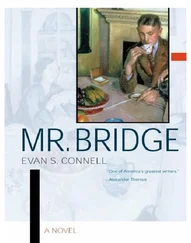“Can you help me?” Grace was asking, but Mrs. Bridge was too depressed to speak.
84. Robbery at the Heywood Duncans’
The next time she met Grace was at a party given by the Heywood Duncans. Shortly after ten o’clock, while the two of them were chatting, just as Mrs. Bridge was reaching for another anchovy cracker, four men appeared in the doorway and they did not look like guests. They were wearing plastic noses attached to horn-rimmed glasses and were carrying pistols. One of them said, “All right, everybody, this is a stick-up!” Another of the men sprang to the top of the piano and pointed his gun at several different people. At first everyone thought it was a joke it was so typical of a stunt Noel Johnson might dream up. But it wasn’t a joke because the robbers made all the guests line up facing the wall with their hands above their heads. Then two of them walked around pulling billfolds out of the men’s pockets and taking bracelets and necklaces and rings from the ladies. Another of the men went upstairs and came down with his arms full of purses and fur coats. Just before the robbers reached Mrs. Bridge, who was standing obediently with her hands as high as possible, something frightened them and the one standing on the piano she afterward described him to the police as not having worn a necktie called out in an ugly voice, “Who’s got the keys to that blue Cadillac out front?”
At this Mrs. Ralph Porter screamed, “Don’t you tell him, Ralph!”
But the bandits took Mr. Porter’s keys, and after telling everyone not to move for thirty minutes they ran out the side door. Heywood Duncan immediately phoned the police while Dr. Foster, who had dropped in unexpectedly and who had been robbed the same as the others, feebly seated himself in a corner and urged everyone to be calm, saying the bandits would not get away with it.
The bandits did get away, though, and it was written up on the front page of the newspaper with pictures on page eight, including a close-up of the scratched piano. Mrs. Bridge, reading the account in the breakfast room next morning after her husband had gone to work, was surprised to learn that Stuart Montgomery had been carrying just $2.14 and that Mrs. Noel Johnson’s ring had been zircon.
As if one robbery were not enough, Mrs. Bridge became involved in another not much of a robbery, and she was de-tained less than ten minutes; still it was frightening. She was in a department store examining some brocade with the idea of altering the scheme in the dining room when, quite un-known to her, someone looted the cash register not six feet away. The theft was discovered a few minutes later and she, along with several other women, was herded into the manager’s office. When it came her time to be interviewed she sat down in front of the desk, adjusted her fur neckpiece, and said, “I surely hope you don’t think I’m the guilty one/’
The manager raised both hands in a faint gesture of dismay at such a thought. He asked if he might see her driver’s license, and when she produced it from her purse he handed it to the police lieutenant who was lounging on the edge of the desk with a felt hat pushed back off his forehead. Mrs. Bridge knew he was a policeman the instant she saw him. She expected him to study the license and ask a great many questions; consequently she was both relieved and slightly ruffled when he barely glanced at her license before handing it back and asked her nothing at all.
“I certainly hope you catch whoever it was/’ she said.
The lieutenant, who knew a bona-fide country-club matron when he saw one, responded by nodding politely.
The manager opened the door for her.
Kansas City was apparently headed for an epidemic of crime such as no one could remember since the days of the hood-lums and political bosses. How the latest scare actually started no one knew, although several women, one of whom was a fairly close friend of Madge Arlen, claimed to know the name of someone who had been assaulted not far from Ward Parkway. Some insisted it had happened near the Plaza, others thought farther south, but they were generally agreed it occurred late at night. The story was that a certain matron had been driving home alone and when she had slowed down for an intersection a man had leaped from behind some shrubbery a clump of spirea, according to Madge and had wrenched open the door. Whether or not the attack had been consummated the story did not say; the important part was that there had been a man and he had leaped up and wrenched open the door. There was nothing about it in the paper, nor in The Tattler > which did not print unpleasant material, and the exact date of the assault could not be determined, only that it had been one dark night not long ago.
As this story began to circulate through the country-club district none of the ladies cared to drive anywhere alone after sundown; if they did they locked themselves in the car and drove with great anxiety. And it became customary at the conclusion of parties where there were “office widows” for the host to get his automobile out of the garage in order to follow the unescorted matrons home, which was the reason there could be seen processions of cars winding through the country-club district late at night.
So Mrs. Bridge came home on those evenings when her husband did not get away from the office in time to attend the party, or when he was too tired to go. At her driveway the procession would halt, engines idling, everyone watching, while she drove into the garage and returned along the driveway so as to be constantly visible until she reached the front door. Having unlocked it she would step inside, switch on the hall lights, and call to him, Tm home!” if she had seen his car in the garage. If he failed to answer she necessarily assumed he was asleep or otherwise occupied. In any event, she would then flicker the lights a few times to show the friends waiting outside that she was safe, after which the caravan would move along.
The idea of a chauffeur had begun to appeal to Mr. Bridge. Traffic was getting more congested all the time, and as he did not enjoy driving anyway he thought it would be well worth the expense, so, after they had considered the matter, Mrs. Bridge telephoned an employment agency and the following evening a tall, affable colored man came out for an interview. Both of them were impressed by his manners. He was from New Orleans, he told them, and this somehow added to his stature. He was dignified and courteous. The longer they talked to him the better they liked him, so he was employed.
In the rear seat of the Chrysler, his briefcase in his lap, Mr. Bridge sat erect and tense, expecting an accident at every corner while being driven to the office. It was less exhausting to battle the traffic himself, but now that he had the chauffeur he could not dismiss him without a reason. Then, too, having set his mind to the proposition, he was determined to make a success of it. At the office he got out, very much relieved, and told the chauffeur what time to pick him up. The chauffeur spent the remainder of the day driving Mrs. Bridge around in her Lincoln, or, when she had no use for him, he would loiter in the basement.
During the third week they began to receive mysterious telephone calls asking for Jules, which was his name. Drawl-ing Negro voices would inquire, “Well, whereabout you figure he at?” if it was his day off. Or, “Yes, ma’am, it sho’ly am mighty impo’tant.” If, reluctantly, she went to the top of the basement steps and called, “Jules? Jules? Someone wishes to speak to you on the phone,” he would not respond, and her patience was severely tested. Eventually they learned that Jules had bought a yellow satin easy chair for his apartment in the north end of the city, but so far he had been unwilling to pay for the chair and these were the creditors who were calling. When a few more weeks had passed an attempt was made to link Mr. Bridge with the payment; a serious talk with Jules having produced no effect, he was dismissed.
Читать дальше












